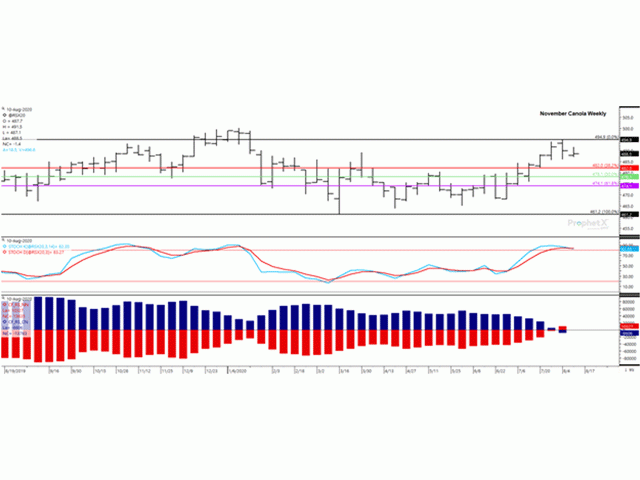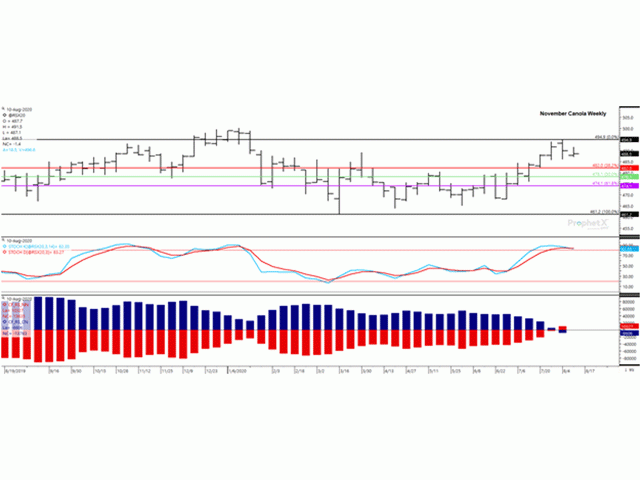Canada Markets
Bearish Signs in Canola Futures, Cash Markets
While a media piece this week has pointed to some of the favorable circumstances taking place in the global market for canola and canola oil over the past year -- stating it's "like gold" in the title -- a number of signals in both futures and cash trade bear watching.
Last week the Nov futures contract reached the highest level traded in over six months at $494.90/metric ton (mt), while a reversal taking place on the same day (Aug. 4) led to a daily loss of $0.70/mt and a weekly loss of $1.60/mt, the first weekly loss in six weeks.
DTN charts show last week's close at the 92nd percentile of its 5-year range for this day, down slightly from the previous week. Looking back at this date over the past five years, the Nov futures were $40.50/mt higher than the same date in 2018-19, while the Nov futures are shown slightly above $500/mt in three of the past five years.
P[L1] D[0x0] M[300x250] OOP[F] ADUNIT[] T[]
We see from the histogram in the lower study that as canola was reaching recent highs, noncommercial traders or speculators were moving from a bearish net-short position to a bullish net-long position (red bars), as seen in CFTC data as of Aug. 4. Even more concerning is the opposite move seen on the part of commercial traders (blue bars), who moved from a bullish net long to a bearish net-short position of 8,606 contracts over the same period. Since the CFTC began reporting canola positions as of July 31, 2018, commercial traders have only held a bearish net-short position for two weeks in October 2018. This group of traders is clearly becoming increasingly comfortable with the supply/demand balance as it appeared in the week ended Aug. 4.
Another concern is seen in cash market data as reported by pdqinfo.ca. Over the past week, Nov futures lost $1.60/mt, while eight of the nine Prairie regions reported by pdqinfo.ca showed prices losing significantly more over the 4-day trading week. While the cash bid for eastern Manitoba increased $0.75/mt over the week and the western Manitoba bid lost $0.65/mt, cash bids seen in the other seven regions closed the week from $6.91/mt to $14.48/mt as basis showed weakness.
The basis reported for the regions of the Prairies as of Aug. 7 are significantly weaker than reported one year ago in all but one of the regions, despite the current 2019-20 carryout forecast by AAFC to be 1.3 million metric tons (mmt) or more lower in 2019-20 when compared to the previous crop year.
Adding to the bearishness on Monday, both Malaysian palm oil and European rapeseed futures have shown bearish technical chart signals in recent trade.
DTN 360 Poll
This week's poll looks at the readers' comfort level with the various crop condition assessments released by government for their particular area. You can weigh in with your thoughts in this poll which is found at the lower right of your DTN Home Page.
Cliff Jamieson can be reached at cliff.jamieson@dtn.com
Follow him on Twitter @Cliff Jamieson
© (c) Copyright 2020 DTN, LLC. All rights reserved.








Comments
To comment, please Log In or Join our Community .